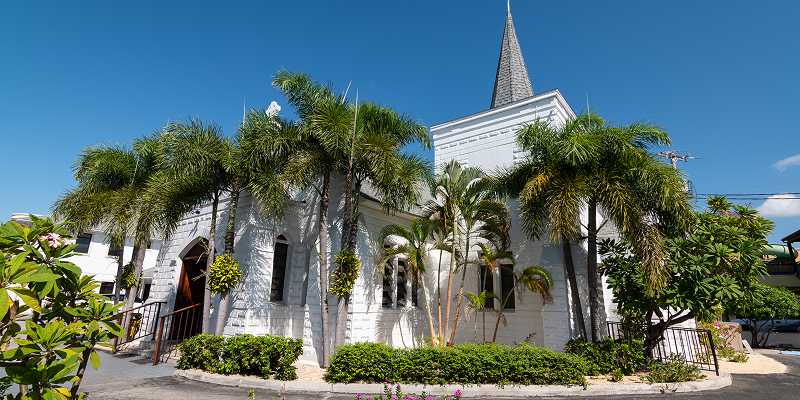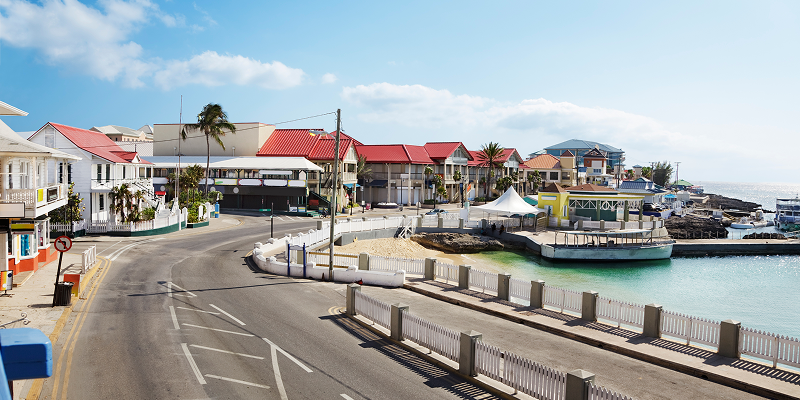The British Overseas Territory of the Cayman Islands occupies three Caribbean islands: Grand Cayman, Little Cayman and Cayman Brac. The more familiar name for this jurisdiction is the Cayman Islands. A significant part of the population of this tropical paradise works in the tourism industry, as up to 2 million fans of diving and carefree beach holidays arrive here every year.
In the business world, the Cayman Islands are better known as a convenient tax haven with a significant number of classic offshore capabilities. In 2023, the Caymans became the home port for 9,794 new companies. In a jurisdiction with a population of about 69,000 people there are over 119,000 active corporations, which is an eloquent testimony to the popularity of the islands with foreign entrepreneurs.
The Cayman Islands remain one of the world’s most attractive offshore jurisdictions due to their zero corporate tax regime, strong confidentiality protections, flexible regulatory framework, and the ability to register a company remotely in just one business day.

8 advantages for companies registered in the Cayman Islands
No corporate tax
The main advantage of the Cayman Islands that attracts foreign business is tax neutrality. Businesses registered in the islands are not subject to income tax, regardless of whether they are tax residents of the Cayman Islands or not. No value added tax is levied in the Cayman Islands. There is also no tax on property, wages and capital gains.
Confidentiality
In the Cayman Islands, public officials, accountants, lawyers and professional registration agents are prohibited by law from disclosing information to third parties about companies officially registered in the country.
The exception is when officially authorised assistance to law enforcement agencies in combating illegal activities. Confidentiality of business is ensured by well-proven mechanisms of co-operation with law enforcement authorities, which strike a balance between the legitimate requirements of the authorities and the interests of the entrepreneur. Under this system, the Registrar can only disclose, upon official request, the name, legal form, date of incorporation, registered address and status of the company.
Flexible approach
Another attractive feature of the Cayman Islands is the absence of onerous requirements for international companies. The flexible approach to operating abroad is reflected in the islands’ corporate law.
For example, this country does not require that directors and officers in an international company be residents of the Cayman Islands. Offshore entrepreneurs are not forced to keep a register of beneficiaries and minutes of general meetings in the office of their place of incorporation. Exempt companies in the Caymans may not be audited and may not call their shareholders to an annual general meeting. (An exception to this rule is companies operating as investment funds, which are regulated by the Cayman Islands Monetary Authority).
Easy registration
You can easily incorporate a new company in the Cayman Islands with the support of knowledgeable corporate lawyers. You will not need to spend significant sums of money on share capital, be personally present in the country and spend several weeks on tedious waiting time.
The vast majority of business structures in Cayman can be incorporated remotely, on the government website. And the official incorporation procedure itself takes only 1 working day.
Robust asset protection
The Cayman Islands are not part of the United Kingdom but are under British sovereignty. The territory is governed by the same common law as the metropolis, which, together with local legislative initiatives and an independent judiciary, ensures that the assets of foreign investors, including intellectual property, are well protected.
Additional factors of reliability of the Cayman Islands are a favourable economy and a stable political system. Having registered a company in the Caymans, a businessman may not worry about the safety of his assets.
Excellent infrastructure
Another strong argument in favour of incorporation in the Cayman Islands is the developed infrastructure for business, which includes:
- modern telecommunication systems – mobile communications and broadband internet connections;
- excellent transport links provided by Grand Cayman’s modernised road network, 2 international airports and a seaport.
All of this together contributes to the success of companies both on the islands and far beyond.
Lack of currency control
There are no exchange controls in the Cayman Islands. By opening a company in this jurisdiction, you will be able to conduct international trade, investments and other financial transactions without administrative obstacles.
In the Caymans, a company can freely send and receive funds and transfer profits to overseas accounts. Due to the absence of currency regulation, entrepreneurs are free to purchase foreign securities, investment property and other high-yielding assets.
Moreover, the absence of currency restrictions saves those businesses engaged in international trade from the time-consuming processes of converting funds, as well as obtaining official permission to exchange foreign currency.
Favourable business environment
The Cayman Islands has come a long way from a distant British colony to an international financial centre. The jurisdiction now boasts a favourable business environment where the overseas businessman has access to the services of banks, trust funds and insurance companies.
More than 300 financial institutions are established in the Cayman Islands, with some 70 banks and trust companies having their own offices in the jurisdiction. More than 11,000 investment funds are registered with the Cayman Islands Monetary Authority.
In the Caymans, for a reasonable fee, you can always get expert level investment, financial market, accounting and legal advice and hire a professional manager.

What companies can be incorporated in the Cayman Islands?
In the Caymans, a foreign businessman has the opportunity to choose from several options to choose the appropriate legal form for his enterprise. Without going into details, all commercial organisations are divided into:
- corporate, with a separate legal personality from its founders and the formation of a legal entity;
- unincorporated, which includes partnerships and sole traders.
Corporations
Exempted Company
An exempted company is the best option for those businessmen who will operate predominantly overseas and do not plan to conduct their main business activities in the Cayman Islands.
An exempted company is denoted by the abbreviation CIEC from the English “Cayman Islands Exempted Company”. This type of commercial structure, like no other, allows a businessman to use all the possibilities of an offshore company.
The advantages of an exempt company in the Caymans:
- A company should not make publicly available information about its shareholders.
- There is no requirement to call shareholders to an annual general meeting.
- Amendments to the constituent documents may be made without administrative or procedural restrictions. However, the company must notify the Registrar of all amendments in a timely manner.
- nominal amount of the share capital may be expressed in any currency, or even in several freely convertible currencies.
- An exempted company has the ability to issue shares without par value and with par value.
- No special licences are required to start operations. CIEC can start its activities as soon as it receives its registration certificate.
- The company does not need to prepare and submit annual tax and financial statements.
Basic requirements for registration
- An office in the Cayman Islands must be specified as the company’s registered office. As a rule, the founders of an exempted company rent it from the incorporation agent for a small fee. Our company provides an office in the Cayman Islands for incorporation as part of its comprehensive offer for entrepreneurs. Subsequently, by decision of the management of the exempted company, the registered office can be changed.
- The share capital that limits the liability of a bankrupt CIEC can be anything. The corporate laws of the jurisdiction do not set a minimum amount and do not require the founders to pay it before incorporation.
- An exempted company must have at least 1 founder. At least one of the shareholders must take responsibility for determining the capital structure of the company. CIEC shareholders can be enterprising citizens of other countries and foreign corporations.
- The capital of an exempted company can only be divided into registered shares. The firm may issue shares of different classes with different rights for their holders.
- It is usually managed by a board of directors or at least one director. The management position may be held by a shareholder or a hired manager. CIECs may be managed by individuals and corporations. Directors are not required to be residents of the Cayman Islands.
Reports and documentation
Exempted companies must comply with the main economic requirement of the authorities – not to conduct commercial activities in the Caymans. The data of beneficiaries of offshore structures do not get into public sources, but entrepreneurs are still obliged to keep a register of shareholders. The register is an internal document of the company and may be located abroad.
As mentioned above, such a firm does not file financial statements and tax returns, but it is required to keep accounting records covering assets, liabilities, sales, purchases and receipts. Documents reflecting the state of affairs of the company must be kept in the office for at least 5 years.
In lieu of a financial statement, an exempt CIEC prepares and submits an Annual Return confirming that in the accounting period:
- no amendments have been made to the constituent documents other than those notified to the Registrar in due course;
- the corporation complied with all the provisions of the Companies Act and conducted its business mainly abroad.
As a rule, the submission of the Annual Return is accompanied by the payment of an annual fee, the amount of which varies depending on the declared size of the founding capital of the company.
2 varieties of exempt companies
There are 2 separate types of exempted companies in the Caymans, the features of which are limited duration or a split shareholding.
A Limited Duration Company has an indication of its corporate form, “Limited Duration Company” or “LDC” at the end of its name.
LCD differs from a regular exempt company in the following respects:
- The company is established for a certain period of time, which is fixed in the statutory documents. The maximum possible term of existence of a Limited Duration Company is 30 years. Shareholders have the opportunity to dissolve their company before the term specified in the memorandum of association expires.
- At least 2 shareholders are required to establish an The founding documents of such a company may stipulate special conditions for the transfer of shares to third parties, which can only take place with the approval of all other shareholders.
A split portfolio company is an exempted company with a capital structure comprising separate shareholdings of different types and denominations, with different rights and obligations of the shareholders. The individual shareholdings in such a company are called cells. There can be up to 15 cells in a single company with a divided share portfolio.
All firms of this type in the Caymans have at the end of their name an indication of the legal form – “SPC” or “Segregated Portfolio Company”.
The features of a company with a split portfolio of shares are as follows:
- Each year, SPC submits 2 reports to the Registrar – the Annual Return and a document showing all changes in the company’s shareholding portfolio during the reporting period.
- The annual renewal fee for such a company is higher because you have to pay separately for each portfolio.
An SPC is a special type of company that allows the creation within itself of separate portfolios of assets, financial liabilities and investments. These portfolios are legally and financially isolated from each other, which means that the liabilities of one portfolio cannot be covered by the assets of another.
Limited Liability Company
The name of such a company contains an indication of its type – “Limited Liability Company” or “LLC”. This commercial structure has a separate legal identity, and the liability of its founders for debts and obligations arising from bankruptcy does not go beyond the amount they contributed to the authorised capital.
Like all corporate structures previously discussed here, LLCs in the Caymans are registered in order to conduct business abroad. A curious feature of a limited liability company in the Caribbean is the structure of the authorised capital, which is divided not into shares, but into shares of the founders.
Another feature of these companies is the use of a locally licensed corporate secretary, who is required to keep a register of LLC beneficiaries with them and transmit ownership information to government databases closed to public access.
A Cayman Limited Liability Company (LLC) must have at least one founder and a registered address in the Cayman Islands. Local and foreign entrepreneurs as well as commercial organisations can establish a limited liability company in the Cayman Islands. The LLC director may be the owner of the company or an employee of the company
Other corporate forms for offshore business registration
In the Cayman Islands, an enterprising foreigner can also register:
- A fund company is a unique business structure that combines the separate legal personality and limited liability of shareholders with the functionality of a private trust company. Fund companies can operate as both commercial enterprises and private investment structures with equal success.
- Special Economic Zone Company – a unique type of exempted company that can operate abroad and in the Cayman Islands inside the Special Economic Zones. For this purpose, the jurisdiction has created 7 so-called “business parks” with a wide range of economic activities – from information technology to organising air transport.
- Foreign company. A corporation operating abroad is formally registered in the Cayman Islands to carry on business, acquire real property or enter into a partnership.
- Non-resident company. Non-resident companies come into existence in the Caymans when an ordinary company, which has been registered to operate both domestically and overseas, decides for whatever reason to conduct all of its business activities overseas, notifies the authorities and is granted the appropriate status.

Partnerships
The following partnerships are available for registration in the Cayman Islands for foreign businesses and commercial organisations
- LP / Limited Partnership – limited partnership;
- LLP / Limited Liability Partnership – limited liability partnership;
- ELP / Exempted Liability Partnership – Exempted Limited Partnership;
- FP / Foreign Partnership – foreign partnership.
For clarity, Imperial & Legal staff have compiled a table with the main characteristics of the partnerships.
| LP | LLP | ELP | FP | |
| Is it a legal entity? | no | yes | no | Depending on the type of foreign partnership |
| Number of partners | from 2 | from 2 | from 2 | from 2 |
| Responsibility of partners | The general partner is unlimited; Limited partners – contribution to LP property | Contribution to the property of LLP | The general partner is unlimited; Limited partners – contribution to the ELP estate | Depending on the type of foreign partnership |
| Partners legal entities | yes | yes | yes | yes |
| Partners – foreign residents | yes | yes | yes | yes |
| Operating in the domestic market of the Cayman Islands | yes | yes | no | No, but can be a partner in an ELP |
| Working abroad | yes | yes | yes | yes |
Partnerships in the Cayman Islands are easier to register and cheaper to keep afloat. However, such a legal form as LP and ELP does not ensure confidentiality to the entrepreneur, as the declaration of the newly formed partnership is published in public sources.
Foreign partnerships are registered in the islands so that the entity can own local property and also act as a partner in the ELP.
All partnerships in the Caymans are required to provide the Registrar with timely information on all changes to their structure. They are also required to pay a small renewal fee each year.
What taxes are paid by companies in the Cayman Islands
To the delight of tens of thousands of entrepreneurs from all over the world, there is no corporate tax in the Caymans. Moreover, corporations and partnerships opened in this jurisdiction do not pay sales tax. They do not pay property taxes, payroll taxes or capital gains taxes.
However, the absence of direct taxes does not mean that corporations and partnerships in the Cayman Islands are completely exempt from fiscal payments, as:
- Importing companies selling foreign products in Cayman pay customs duties to the budget, which can reach 27% of the value of imported goods.
- Transactions involving immovable property in the jurisdiction (as well as shares in companies owning land in the Cayman Islands) are subject to 7.5% stamp duty. More modest rates of stamp duty apply to mortgages and residential property transactions.
- Each year, Caymanian companies pay a renewal fee. The amount paid depends on the type of business organisation and, in the case of exempt and non-resident companies, on the amount of the declared share capital.
All amounts are in KYD (Cayman Islands dollars).
| Item | Amount (KYD) | Notes |
| Minimum authorised capital | 1 | Minimum permitted amount |
| Standard authorised capital | 50,000 | Commonly used for company registration |
| Registration fee | 500 | One-time payment upon registration |
| Annual government fee | 500 | Payable annually |
| Certificate issuance fee | 75 | For issuance of registration certificate |
| Document filing fee | 75 | For filing registration documents |
| Expedited processing fee | 100 | For expedited processing of documents/certificate |
| Expedited registration fee | 400 | For expedited company registration |
Notes:
- The table summarizes the main costs and requirements related to authorised capital and company registration in the Cayman Islands.
- If you need additional columns (such as “Frequency” or “Mandatory/Optional”), please specify.
Step-by-step algorithm of company registration in the Cayman Islands
Reliable legal support from Imperial & Legal will greatly simplify the incorporation process in Cayman. Let’s take a look at the sequence in which a prospective Caymanian businessman should proceed.
Step 1: Consultation
Our staff will organise a meeting with the entrepreneur, or negotiate online via video link, to thoroughly record all the circumstances and requirements of the client.
Imperial & Legal will usually have a tailored plan of action for the businessman’s needs at the first meeting. Moreover, having analysed your wishes and possibilities, we will advise you on the type of company in Cayman that would be best suited to your business activities.
Step 2: Company Name Verification and Approval
Company registration in the Cayman Islands is carried out by CIGR. The acronym stands for Cayman Islands General Registry, the government department that regulates resident and non-resident businesses, the one we refer to throughout this article as the Registrar for short.
The CIGR is also responsible for approving the names of newly registered companies on the islands. To put it simply, the department’s officials will be sure to check that your business name is acceptable and does not overlap with existing corporations and partnerships.
Our agents check the name proposed by the clients for the future company on the Registrar’s website and approve the acceptable variant.
Step 3. Clarifying the company structure, drafting documents
Even an offshore company must have a registered office in the Cayman Islands. Some types of corporations require a local secretary to operate successfully. Imperial & Legal provide the businessman with an office in Georgetown for incorporation and select a reliable corporate secretary with a licence.
At this stage, the founders need to finalise the structure of their company and ideally appoint a director or board of directors. All agreements reached are recorded in the memorandum of association and articles of association.
Our lawyers also clarify with entrepreneurs the information to be entered into the official application form and, if necessary, prepare copies of the relevant documents.
Step 4: Registration
Imperial & Legal staff complete the online registration application form on the state CIGR website, upload the statutory documents and pay the registration fee.
Each step in the preparation process was carried out with the participation of our consultants, so the representatives of the Registrar will have no additional questions on your application and no later than in 7 days your company will be registered.
If you want faster, you can pay for a priority application process and become a company owner in the Caymans within one business day!
Why is it beneficial for entrepreneurs to cooperate with Imperial & Legal?
Mainly because we don’t abandon our clients once they are registered and help them to fully realise the full potential of a global financial centre like the Cayman Islands.
You can count on Imperial & Legal for reliable legal support when you need a Cayman bank account for your business, when you decide to apply for a trade licence or when you prepare your Annual Return!


